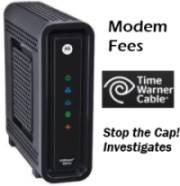 Two class-action lawsuits were filed Tuesday on behalf of Time Warner Cable customers in 29 states to force the company to refund ill-gotten modem rental fees in violation of consumer fraud laws.
Two class-action lawsuits were filed Tuesday on behalf of Time Warner Cable customers in 29 states to force the company to refund ill-gotten modem rental fees in violation of consumer fraud laws.
“It’s a massive hi-tech consumer fraud accomplished by low-tech methods,” said attorney Steven L. Wittels. “Send customers confusing notice of the fee in a junk mail postcard they’ll throw in the garbage, sock them with a $500 million dollar a year rate hike, then announce on your website that customer satisfaction is your #1 priority. That’s some way to deliver satisfaction.”
The context for the class action suit is that Time Warner Cable began imposing the fee Nov. 1 without giving customers appropriate notification. New York City residents had little more than two weeks notice in the form of a poorly printed postcard. Some residents in western New York and other cities have still not received notification from the cable company, either on bills or in the mail.
The two lawsuits were brought on behalf of Manhattan resident Kathleen McNally and Fort Lee, N.J. resident Natalie Lenett, but the suit asks the court to order refunds for all Time Warner Cable customers charged modem fees across their national service area.
The Consumerist thought the company’s failure to meet the timely notification requirement about the forthcoming modem rental fee might have the cable company dead to rights:
Pricing and Service Changes
Unless otherwise provided by applicable law, Time Warner Cable will notify you 30 days in advance of any price or service change. Notice of these changes may be provided on your monthly bill, as a bill insert, as a separate mailing, in the Legal Notice section of the newspaper, on the cable system channel(s) or through other written means.
But on closer examination, that provision only applies to pricing and service changes for Time Warner Cable’s television service, not broadband or home phone service.
In fact, Time Warner Cable’s new Subscriber Agreement has reserved the right to change just about anything it likes, just by updating the terms and conditions on its website:
We May Change our Customer Agreements
(a) We may change our Customer Agreements by amending the on-line version of the relevant document. Unless you have entered into an Addendum that ensures a fixed price for a period of time (for instance, a Price Lock Guarantee Addendum), we may also change the prices for our services or the manner in which we charge for them.
(b) If you continue to use the Services following any change in our Customer Agreements, prices or other policies, you will have accepted the changes (in other words, made them legally binding). If you do not agree to the changes, you will need to contact your local TWC office to cancel your Services.
(c) Any changes to our Customer Agreements are intended to be prospective only. In other words, the amended version of the relevant document only becomes binding on you as of the date that we make the change.
One significant change Time Warner inserted in its Subscriber Agreement (the one printed in tiny print on tissue-thin paper, occasionally mailed with your bill) was deemed so important, it appears highlighted and in bold language:
Time Warner Cable now requires customers to submit disputes individually to binding arbitration, denying the right to bring or participate in any class action case. However, customers can opt-out of this provision simply by notifying the company through an online form. (You will need your Time Warner Cable account number.)
In practice, this would require McNally, Lenett, and millions of other customers to individually submit to a time-consuming arbitration proceeding — all to fight a $3.95 monthly fee. Few would bother. Wittels told The Consumerist the lawsuit still has merits because of other language Time Warner Cable maintains in its agreement which he believes holds the door open to a class action challenge.
Although customers are invited to purchase their own cable modem equipment to avoid the fee, the lawyers involved say the options are limited and expensive.


 Subscribe
Subscribe



